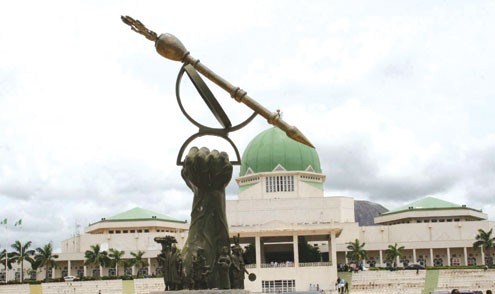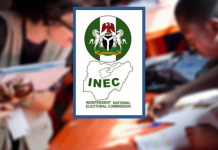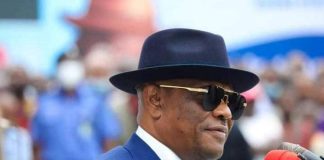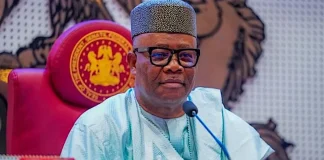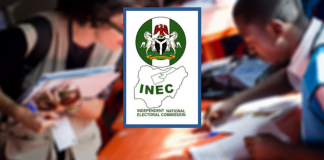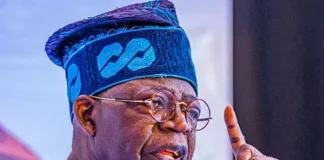🌿 Ruzu Non-Alcoholic Herbal Bitters
Ruzu Non-Alcoholic Herbal Bitters is a natural health supplement specially formulated to:
- ✅ Promote general wellness
- ✅ Detoxify the body
- ✅ Support the treatment of various ailments
Made from a powerful blend of 100% organic and medicinal herbs, Ruzu is completely alcohol-free, making it ideal for:
- 👪 All age groups
- 🌱 Health-conscious individuals
- 🌿 Anyone seeking non-alcoholic herbal remedies
Whether you're looking to boost your vitality, cleanse your system, or support healing the natural way, Ruzu Bitters offers a trusted herbal solution.
In anticipation of the general elections in 2027, the Inter-Party Advisory Council (IPAC) has redoubled its efforts to increase the presence of women in Nigerian politics through legislative action.
In order to constitutionally reserve 74 seats in the National Assembly for women, the council is pushing for the approval of a crucial bill.
At a two-day empowerment conference with the theme “Breaking the Barriers and Shaping Positive Attitudes Towards Inclusive Politics in Nigeria” that took place in Abuja, the proposition was at the center of discussions.
The event, which was organized by the National Institute for Policy and Strategic Studies (NIPSS) in collaboration with IPAC’s Directorate of Women Affairs, brought together well-known figures advocating for political gender equality.
During the forum, Yusuf Mamman Dantalle, the National Chairman of IPAC, emphasized the council’s dedication to inclusive governance. In his push to get the law approved by the National Assembly and the President, he reiterated that IPAC will not back down.
In light of this, IPAC once again urges the National Assembly to enact the bill reserving reserved seats for women in parliament. According to Dr. Dantalle, the law aims to increase female participation in politics by allocating 74 seats to women.
In order to formalize its inclusive approach, IPAC said that it has established three specialized directorates for women, youth, and people with disabilities. From the local to the national levels, these directorates are anticipated to be essential in changing the dynamics of political parties and guaranteeing fair representation.
Dantalle emphasized the need to eradicate structural injustices that have prevented women from actively participating in politics for a long time. Economic marginalization, ingrained cultural prejudices, and unequal educational opportunities are some of these obstacles.
“In any democratic society, women’s active political participation is essential to attaining equity, equality, inclusivity, and sustainable development,” he emphasized.
Dantalle also emphasized the significance of passing the Electoral Offenses Commission bill in his broader advocacy, citing its need to support accountable and clean elections.
“The Council requests that the National Assembly enact the Electoral Offenses Commission bill so that electoral offenders and their sponsors can be prosecuted,” he continued.
IPAC suggested using a single-day voting format for Nigeria’s elections as part of a larger electoral reform. Dantalle proposed that a unified election day would simplify operations and save money, citing successful precedents from the United States, Ghana, and Sierra Leone.
“A one-day election will minimize expenses, minimize disturbances, and tackle logistical issues,” Dantalle said.
In the meantime, Pauline Tallen, the previous Minister of Women Affairs, proposed a more drastic strategy for accelerating gender parity. She urged political parties to amend their constitutions to ensure that women hold at least 50% of all positions that are elected or appointed.
All political parties should immediately alter their constitutions to provide special seats for women, according to one solution I suggest. She stated that parties ought to require women to hold at least 50% of appointments and elective seats.
A gender-based nomination system that rotates between male and female candidates on party platforms is known as the “Zebra Policy,” which Tallen also fought for. She made the case that political parties ought to support social reform in addition to becoming leaders.
Political parties must take the initiative to remove cultural and religious conventions that prevent women from participating in politics since they are essential to governance and policy direction, she continued.
Read Also: Timi Frank: Tinubu Using Blackmail and Pressure on Five PDP Governors to Join APC
In closing, Tallen made an obvious reference to Nigeria’s First Couple.
“President Bola Tinubu need to take the lead in promoting gender equality. Tallen recommended that Mrs. Oluremi Tinubu take advantage of her position to support the mainstreaming of women in Nigerian politics.
Tallen criticized Nigeria for having a dismal record of female political representation worldwide. She pointed out that women now hold just 4.2% of the seats in the National Assembly, which puts the country well behind countries like Rwanda, where 64% of the legislature is made up of women.
She declared, “Nigeria, the Giant of Africa, must lead the way in gender mainstreaming and eliminating gender bias in politics.”

